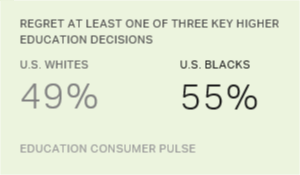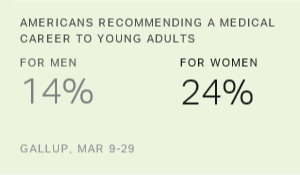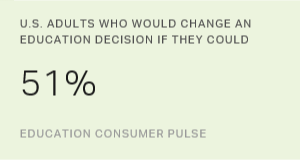Story Highlights
- 51% of U.S. adults would change at least one education choice
- Blacks and Asians most likely to regret their choice of institution
WASHINGTON, D.C. -- About half of U.S. adults express some regret when reflecting on their education experiences, but racial and ethnic minorities groups are slightly more likely than whites to regret at least one of three key education decisions. -- their degree, the institution they attended or their field of study. The relatively higher percentage of blacks, Asians and Hispanics who regret their choice of school is driving these overall differences.
| Overall U.S. adults | White | Black | Hispanic | Asian | |||||||||||||||||||||||||||||||||||||||||||||||||||||||||||||||||||||||||||||||||||||||||||||||
|---|---|---|---|---|---|---|---|---|---|---|---|---|---|---|---|---|---|---|---|---|---|---|---|---|---|---|---|---|---|---|---|---|---|---|---|---|---|---|---|---|---|---|---|---|---|---|---|---|---|---|---|---|---|---|---|---|---|---|---|---|---|---|---|---|---|---|---|---|---|---|---|---|---|---|---|---|---|---|---|---|---|---|---|---|---|---|---|---|---|---|---|---|---|---|---|---|---|---|---|
| % | % | % | % | % | |||||||||||||||||||||||||||||||||||||||||||||||||||||||||||||||||||||||||||||||||||||||||||||||
| Would change degree | 12 | 12 | 14 | 12 | 11 | ||||||||||||||||||||||||||||||||||||||||||||||||||||||||||||||||||||||||||||||||||||||||||||||
| Would change field of study | 36 | 36 | 37 | 34 | 36 | ||||||||||||||||||||||||||||||||||||||||||||||||||||||||||||||||||||||||||||||||||||||||||||||
| Would change institution | 28 | 27 | 33 | 30 | 33 | ||||||||||||||||||||||||||||||||||||||||||||||||||||||||||||||||||||||||||||||||||||||||||||||
| Would change one of these three choices | 51 | 49 | 55 | 52 | 54 | ||||||||||||||||||||||||||||||||||||||||||||||||||||||||||||||||||||||||||||||||||||||||||||||
| Education Consumer Pulse, June 29, 2016-July 30, 2017 | |||||||||||||||||||||||||||||||||||||||||||||||||||||||||||||||||||||||||||||||||||||||||||||||||||
These results are based on more than 130,000 interviews conducted as part of the Education Consumer Pulse from June 29, 2016-July 30, 2017. The Education Consumer Pulse, launched in 2016 by Gallup and Strada Education Network, is a nationally representative poll of U.S. adults aged 18-65 in all 50 states and the District of Columbia in which respondents are asked to reflect on their education experiences.
The findings suggest that racial or ethnic minority students may need more guidance when making critical education decisions. In contrast to the moderate differences in education regret seen among racial and ethnic groups, Gallup found slight differences between men and women, and no relationship between regret and age.
For all racial and ethnic groups, field of study and choice of institution are the areas in which most would do things differently. Hispanics (34%) are less likely than other racial and ethnic groups to wish they selected a different major or field of study.
Thirty-three percent of blacks and Asians would have attended a different institution, compared with 27% of whites and 30% of Hispanics.
Of the three education decisions, U.S. adults (12%) are least likely to say they would change the level of degree they obtained. But blacks (14%) are slightly more likely than whites, (12%), Hispanics (12%) and Asians (11%) to say they would pick a different degree if they could.
Education Regret Could Be Linked to Lower Degree Attainment
Previous Gallup and Strada research found that those with some college, but no degree, are the most likely to have second thoughts about at least one of their education decisions. Among this sample of U.S. adults with at least some postsecondary education, Asians (74%) and whites (54%) are more likely to have completed a bachelor's degree or higher, while Hispanics and blacks are more likely have some college education but no degree. These differences in educational attainment suggest different factors may drive regret in Asians than Blacks and Hispanics, and higher levels of regret among Blacks and Hispanics compared with whites could be related to the degree level they pursued.
| Overall U.S. adults | White | Black | Hispanic | Asian | |||||||||||||||||||||||||||||||||||||||||||||||||||||||||||||||||||||||||||||||||||||||||||||||
|---|---|---|---|---|---|---|---|---|---|---|---|---|---|---|---|---|---|---|---|---|---|---|---|---|---|---|---|---|---|---|---|---|---|---|---|---|---|---|---|---|---|---|---|---|---|---|---|---|---|---|---|---|---|---|---|---|---|---|---|---|---|---|---|---|---|---|---|---|---|---|---|---|---|---|---|---|---|---|---|---|---|---|---|---|---|---|---|---|---|---|---|---|---|---|---|---|---|---|---|
| % | % | % | % | % | |||||||||||||||||||||||||||||||||||||||||||||||||||||||||||||||||||||||||||||||||||||||||||||||
| Less than bachelor's degree | 48 | 46 | 56 | 61 | 26 | ||||||||||||||||||||||||||||||||||||||||||||||||||||||||||||||||||||||||||||||||||||||||||||||
| Bachelor's degree or higher | 52 | 54 | 44 | 39 | 74 | ||||||||||||||||||||||||||||||||||||||||||||||||||||||||||||||||||||||||||||||||||||||||||||||
| Education Consumer Pulse, June 29, 2016-July 30, 2017 | |||||||||||||||||||||||||||||||||||||||||||||||||||||||||||||||||||||||||||||||||||||||||||||||||||
Bottom Line
Half of all U.S. adults would change at least one of three education choices -- their degree, field of study or institution -- suggesting that students need more information and help in making these decisions. Minority students are slightly more likely than whites to regret an education decision, mainly because the former are more likely to have second thoughts about the institution they attended.
These data highlight for the need for postsecondary education leaders and policymakers to ensure that students have the information to make informed choices at critical points along their education path, and that they have access to programs and resources to help them be successful in their chosen degree programs. These issues are especially important for minority students, who may not have as much access to the information or guidance they need prior to selecting a postsecondary education path.

Optimize Your University
Engage students to better prepare them for great jobs and great lives.
Learn more via the Education Consumer Pulse Inaugural Report: On Second Thought: U.S. Adults Reflect on Their Education Decisions. Follow @GallupEDU and @StradaEducation on Twitter and use #EduPulse to join the conversation.
Survey Methods
Results for this Gallup poll are based on telephone interviews conducted June 29, 2016-July 30, 2017, with a random sample of 131,986 adults, aged 18 to 65, living in all 50 U.S. states and the District of Columbia.
For results based on the total sample of national adults, the margin of sampling error is ±1 percentage point at the 95% confidence level.
For results based on the sample of 89,256 white adults, the margin of sampling error is ±0.5 percentage points at the 95% confidence level.
For results based on the sample of 13,374 black adults, the margin of sampling error is ±1.5 percentage points at the 95% confidence level.
For results based on the sample of 15,198 Hispanic adults, the margin of sampling error is ±1.6 percentage points at the 95% confidence level.
For results based on the sample of 3,954 Asian adults, the margin of sampling error is ±2.4 percentage points at the 95% confidence level.
All reported margins of sampling error include computed design effects for weighting.
Each sample of national adults includes a minimum quota of 70% cellphone respondents and 30% landline respondents, with additional minimum quotas by time zone within region. Landline
Learn more about how the Education Consumer Pulse works.





